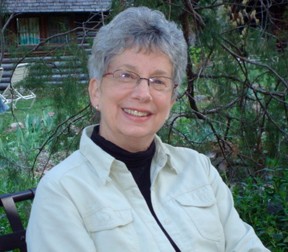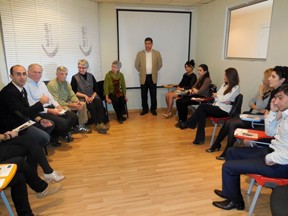Door County Therapist Writes for Azerbaijani Magazine
- Share
- Tweet
- Pin
- Share
The questions Susan McAninch, a retired therapist, answers in her column are pretty universal – How do I build a happy marriage? What level of friendship can I have with co-workers? How can I teach my child to behave?
But McAninch’s columns aren’t for a typical American audience. She writes for an Azerbaijani business magazine called Monitor Consulting, where she answers readers’ business and personal questions, and often introduces readers to common behavior concepts.
“With each response that I give, I feel I need to start with a little primer, a little education, around whatever the topic is,” she said. “We can’t really understand someone else, and when there are so many cultural differences, that really adds a lot.”

Susan McAninch.
Azerbaijan is a mostly Muslim country between Armenia and the Caspian Sea. It became independent from the USSR in 1991, and is now a democracy.
In October, McAninch traveled to Azerbaijan with her husband Jim, and Shirley and Rudy Senarighi. They visited Anar Bayramov, one of the Azerbaijani delegates who visited Door County in 2011 to learn about democracy with the local League of Women Voters.
In Azerbaijan, they met with those delegates, visited with Bayramov’s family and hosted a question and answer session for McAninch and her readers. Twenty-five people attended the session, sitting in a circle with McAninch to talk about their issues at home and work.
“Over the course of two hours we got very comfortable with one another and there were tears shed and certain things disclosed,” McAninch said. “The focus was really on rights – worker rights, women’s rights… the male-female dichotomy, issues around children’s rights, special needs kids.”
“If they begin the dialogue, then change can begin to take place.” – Susan McAninch
Azerbaijanis have many individual rights protected in the country’s constitution, but McAninch said their cultural norms still keep people in strict societal roles. Although gender equality is protected, women are still expected to marry and take care of the family, and in some parts of the country, arranged marriages still take place.
“As much as there are some rights on the books, they really are not honored,” McAninch said. “It’s not like Saudi Arabia, women can wear what they choose and so forth, but they’re expected pretty much to do it all, and to do it all at home.”
McAninch had to remind the Azerbaijanis who attended the session that cultural change takes time. She said America may have more personal freedom and social protections, but our country has a long way to go, just like Azerbaijan.
“If they begin the dialogue, then change can begin to take place,” McAninch said. “That isn’t unlike what we all learn here.”
Through writing columns, communicating with readers, befriending Bayramov and visiting Azerbaijan, McAninch has learned that at the root of everything, people everywhere have similar needs and goals.
“This experience has certainly reinforced that people are people everywhere,” she said. “Parents love their children, parents want to do the best, people in the workplace want to be productive and workers want to perform well in their jobs. There’s going to be conflict between management and the work force. People are people.”

